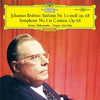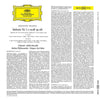



Brahms - Symphony N°1 - Karl Böhm & Michel Schwalbe
Johannes Brahms - Symphony No.1 in C minor, Op.68
Michel Schwalbe - violin
Berliner Philharmoniker Orchestra
Karl Böhm - conductor
1 LP, standard sleeve
Original analog Master tape : YES
Heavy Press : 180g
Record color : black
Speed : 33 RPM
Size : 12'’
Stereo
Studio
Record Press : Pallas GmbH in Germany
Label : Analog Phonic
Original Label : Deutsche Grammophon
Recorded in Jesus-Christus-Kirche, Berlin, in October 1959
Engineered by Günther Hermanns
Produced by Hans Weber
Remastered by Rainer Maillard at Emil Berliner Studios from the original masters of Universal Music
Originally released in 1960
Tracks:
Side A
- Un Poco Sostenuto - Allegro - Meno Allegro
- Andante Sostenuto
Side B
- Un Poco Allegretto E Graziozo - Attacca
- Adagio - Piu Andante - Allegro Non Troppo, Ma Con Brio - Piu Allegro - Piu Allegro
Reviews :
« This performance of the (Brahms) First Symphony is formidable competition for even the best that the current catalogue can offer. Böhm’s (Brahms Symphony No.1) is a performance of wonderfully rich detail, the woodwind soli full of charac-ter, the orchestral colouring beautifully judged: where Karajan presents a blended totality of sound, Böhm is intent that we should see both the wood and the trees. Böhm’s view of the Symphony is urgent and vigorous: though he does not miss the broad strength of the introduction, the ensuing allegro has a purposeful athleticism that contrasts most strik-ingly with the heavy grimness of Karajan’s reading. The introduction to the finale is also an instructive comparison: Karajan sees it as an eloquent lament, Böhm as a transition of unbearable tension – one almost dreads that the great C major theme will not, after all, arrive. This is a noble performance that no Brahmsian should miss hearing, regardless of his current preferences; it is excellently recorded. » - The Gramophone Magazine
Ratings :
Discogs : 3 / 5

